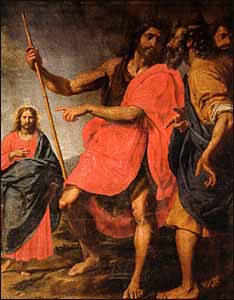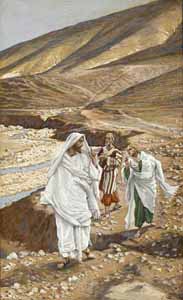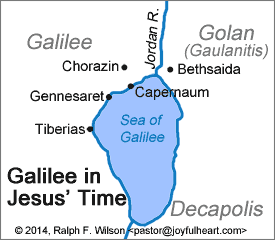Free E-Mail
Bible Studies
Beginning the Journey (for new Christians). en Español
Old Testament
Abraham
Jacob
Moses
Joshua
Gideon
David, Life of
Elijah
Psalms
Solomon
Songs of Ascent (Ps 120-135)
Isaiah
Advent/Messianic Scriptures
Daniel
Rebuild & Renew: Post-Exilic Books
Gospels
Christmas Incarnation
(Mt, Lk)
Sermon on the Mount
(Mt 5-7)
Mark
Luke's
Gospel
John's Gospel
7 Last Words of Christ
Parables
Jesus and the Kingdom
Resurrection
Apostle Peter
Acts
The Early Church
(Acts 1-12)
Apostle Paul
(Acts 12-28)
Paul's Epistles
Christ Powered Life (Rom 5-8)
1 Corinthians
2 Corinthians
Galatians
Ephesians
Vision for Church
(Eph)
Philippians
Colossians,
Philemon
1
& 2 Thessalonians
1 & 2 Timothy,
Titus
General Epistles
Hebrews
James
1 Peter
2 Peter, Jude
1, 2, and 3 John
Revelation
Revelation
Conquering Lamb of Revelation
Topical
Glorious Kingdom, The
Grace
Great Prayers
Holy Spirit, Disciple's Guide
Humility
Lamb of God
Listening for God's Voice
Lord's Supper
Names of God
Names of Jesus
Christian Art
About Us
Podcasts
Contact Us
Dr. Wilson's Books
Donations
Watercolors
Sitemap
 Ottavio Vannini (1585-c. 1643), 'Saint John showing Christ to Saint Andrew' (17th century), oil on canvas, San Gaetano, Florence. |
The Synoptic Gospels relate later seaside callings of the fishermen and Levi (Matthew) the tax collector. But John shares an intimate encounter that probably took place at the Jordan where Jesus had just been baptized and proclaimed as the Lamb of God (1:29).
Perhaps more than any place in the Bible, this passage illustrates how people come to Christ by personal recommendation of a person they know and respect.
This incident seems to take place in Judea. But a number of Galileans have come to John's "revival meetings." Perhaps they had all come down from Galilee together to Passover in Jerusalem, and then down to the Jordan to hear John's message. Many of them know each other from Galilee.
John's Disciples Begin to Follow Jesus (1:35-37)
"35 The next day John was there again with two of his disciples. 36 When he saw Jesus passing by, he said, 'Look, the Lamb of God!' 37 When the two disciples heard him say this, they followed Jesus." (1:35-37)
As a great preacher of his time, John the Baptist has attracted disciples, men who hang out with him to learn from him. The word is mathētēs, generally, "learner, pupil, disciple." In particular, "one who is rather constantly associated with someone who has a pedagogical reputation or a particular set of views, disciple, adherent."[50]
Here is the first example of John's later words, "He must increase, but I must decrease" (3:30). It takes a great man or great woman to encourage your followers to follow someone greater than you. Even so, we know that John continued to attract disciples until his death and beyond.[51]
But these two begin to follow Jesus. This term "follow" is akoloutheō, literally "to come after." But it also has a specific figurative sense that we see in the Four Gospels, "to follow someone as a disciple, be a disciple, follow."[52]Jesus uses this word when he calls out to people: "Follow me!"
Q1. (John 1:35-37) Upon whose recommendation did Andrew
and another person start following Jesus? What did this recommendation cost the
recommender in this case?
https://www.joyfulheart.com/forums/topic/1397-q1-recommending-jesus/
"Come and See" (1:38-39)
Whenever I read these verses I am fascinated -- and amused -- by how Jesus engages these inquirers.
"38 Turning around, Jesus saw them
following and asked, 'What do you want?'
They said, 'Rabbi' (which means Teacher),
'where are you staying?'
39 'Come,' he replied, 'and you will see.'
So they went and saw where he was staying, and spent that day with him. It was about the tenth hour[53]." (1:38-39)
Note that these two are following, but it is Jesus who initiates the conversation. Jesus turns around and sees them. He asks what they want. They don't really answer his question, but suggest that they would like to talk further, so they ask where he is staying. I love Jesus' answer: "Come and see." He doesn't give them an address or make an appointment. He invites them to come along with him and walk with him.
This seems characteristic of Jesus today. He doesn't answer all our questions, but he invites us to journey along with him. Following him -- and in the process, learning from him -- is the essence of what it means to be a disciple. Mark's Gospel tells us of the Twelve:
"He appointed twelve -- designating them apostles -- that they might be with him and that he might send them out to preach and to have authority to drive out demons." (Mark 3:14-15)
If we want to become close-following disciples of Jesus, we must "hang out with him," spend time with him so we can learn from him and pattern our lives after him.
Q2. (John 1:38-39) Why doesn't Jesus tell his inquirers
where he is staying? Why was it important for disciples to "be with" Jesus? What
does "being with" Jesus mean today?
https://www.joyfulheart.com/forums/topic/1398-q2-being-with-jesus/
Jesus Calls Peter (1:40-42)
 James J. Tissot, 'The Calling of Saint John and Saint Andrew' (1886-94), gouache on paper, 9.7x6", Brooklyn Museum.
James J. Tissot, 'The Calling of Saint John and Saint Andrew' (1886-94), gouache on paper, 9.7x6", Brooklyn Museum. |
The two disciples who have begun to follow Jesus aren't quiet about their discovery. They tell their friends. We don't know the identity of the unnamed companion -- he may be John himself. But the other is Andrew.
"40 Andrew, Simon Peter's brother, was one of the two who heard what John had said and who had followed Jesus. 41 The first thing Andrew did was to find his brother Simon and tell him, 'We have found the Messiah' (that is, the Christ). 42 And he brought him to Jesus. Jesus looked at him and said, 'You are Simon son of John. You will be called Cephas' (which, when translated, is Peter)." (1:40-42)
Bible teachers have long drawn attention to Andrew's reaction to his time with Jesus.
"The first thing Andrew did was to find his brother Simon and tell him...." (1:41a)
This is the basis of the popular "Operation Andrew" program, used by Billy Graham Crusades and many others, which involves listing your friends and acquaintances, praying for them, and inviting them to attend a meeting with you. It's a great program, easily understood by people.
But notice that Andrew doesn't invite his brother Peter to a meeting or a "program." He invites him to meet Jesus. In Andrew's day this was a social act. But in our day, since Jesus doesn't walk in the flesh, it is an intensely spiritual act. Usually prayer is the way we introduce people to Jesus.
I've found that especially when people are hurting, I tell them how Jesus can help. If they are willing, I begin to pray and in my prayer introduce them to Jesus. I might say something like, "Jesus, this is Joe. He needs your help...." Then I ask Joe to tell Jesus what he's told me. Most of the time in that context, I've found that people will begin to pray rather naturally. You've modeled prayer for them, and you may have to coach them a bit to get them talking to God. It may seem kind of bold, but when a person is ready, this seems like a very natural way to introduce someone to Jesus.
The content of Andrew's message to his brother is, "We have found the Messiah." For a very long time, Jews had been expecting the Messiah, the descendant of David, to return and deliver Israel. Andrew tells Peter that they have found this person! Incidentally, "Messiah" is a transliteration of the Hebrew word māshîaḥ, "anointed," from the Hebrew custom of pouring oil upon the head of one who is set apart for a particular office of king or priest. The Greek equivalent is christos, "smeared, anointed."
When Peter comes to Jesus, the Master looks at him and says, "You are Simon son of John. You will be called Cephas." Cephas is the Aramaic word for "rock." Petros (Peter) is the Greek word for "rock." Jesus seems to be prophesying to Peter of his future as the rock, the foundation, by his faith, of the new Christian movement. Later, when Peter confesses Jesus to be "the Christ, the Son of the Living God," Jesus says:
"And I tell you that you are Peter, and on this rock I will build my church, and the gates of Hades will not overcome it." (Matthew 16:1)
I wonder what "new name" Jesus has for you? What future does he have for you to live into?
Q3. (John 1:40-42) What role does Andrew play in Simon
Peter's conversion? Today, why do so many Christians substitute bringing a
person to Jesus with bringing them to church? What might be the similarities?
What might be the differences?
https://www.joyfulheart.com/forums/topic/1399-q3-bringing-a-friend-to-jesus/
Jesus Calls Philip (1:43-44)
 Galilee in Jesus' Time (larger image) |
"43 The next day Jesus decided to leave for Galilee. Finding Philip, he said to him, 'Follow me.' 44 Philip, like Andrew and Peter, was from the town of Bethsaida." (1:43-44)
About to leave the Jordan in Judea to go to Galilee, Jesus seeks out Philip. This is the first time we meet Philip in John's Gospel, but he may have been the other unnamed disciple of John the Baptist who had begun to follow Jesus (1:37) -- we just don't know for sure.
Notice the variation. In the case of Andrew and his brother Peter, Andrew brings Peter. But in the case of Philip, Jesus seeks him out. People come to faith in Christ in many ways -- there isn't a single formula.
Verse 44 says that Philip, Andrew, and Peter are all from the town of Bethsaida. See Lesson 13 for more about this town.
Philip Introduces Nathanael to Jesus (1:45-50)
But Philip doesn't just come along by himself. He tells someone else! (Are you sensing a pattern here?)
"45 Philip found Nathanael and told
him, 'We have found the one Moses wrote about in the Law, and about whom the
prophets also wrote -- Jesus of Nazareth, the son of Joseph.'
46 'Nazareth! Can anything good come from there?' Nathanael asked.
'Come and see,' said Philip.
47 When Jesus saw Nathanael approaching, he said of him,
'Here is a true Israelite, in whom there is nothing false.'
48 'How do you know me?' Nathanael asked.
Jesus answered, 'I saw you while you were still under the fig tree before
Philip called you.' 49
Then Nathanael declared, 'Rabbi, you
are the Son of God; you are the King of Israel.' 50
Jesus said,
'You believe because I told you I saw you under the fig tree. You
shall see greater things than that.'" (1:45-50)
Nathanael, whose name means "God has given," is a skeptic. Philip extols Jesus to him as the "prophet" that Moses said would come (Deuteronomy 18:15) and the Messiah/Deliverer that the prophets foretold (Micah 5:2 and many others). But when Philip mentions that Jesus is from Nazareth, his natural prejudice comes out:
"Nazareth! Can anything good come from there?" (1:46a)
Perhaps Nathanael knows Micah 5:2 that says the Messiah will be born in Bethlehem. Or maybe he disdains Nazareth as an inconsequential town. Philip doesn't argue with him. Rather, he invites him to see for himself. When dealing with skeptics, invite them to try Jesus for themselves. To try praying an honest prayer to him, "Jesus, if you are real, please show me."
Nathanael does come with Philip, and when Jesus sees him he says something that seemed all too familiar to Nathanael:
Jesus: "Here is a true Israelite, in whom there
is nothing false."
Nathanael: "How do you know me?"
Then Jesus refers to some incident that Nathanael experienced "under the fig tree." There are a lot of fig trees in Israel, so being under a fig tree wouldn't be remarkable in and of itself. It is something else that Jesus knows -- and Nathanael knows he knows! Nathanael responds with instant faith in response to this prophetic insight:
"Rabbi, you are the Son of God; you are the King of Israel." (1:49)
This confession, "You are the Son of God," seems very similar to John the Baptist's confession in 1:34. "King of Israel" is another way of saying that Jesus is the Messiah, the promised son of David (2 Samuel 7:11-16) who would restore the throne of Israel once again. Jesus' prophetic insight about the Samaritan woman at the well prompts similar faith. Her response to her townspeople is,
"Come, see a man who told me everything I ever did. Could this be the Christ?" (4:29)
Jesus seems to have been exercising what is sometimes referred to as the "word of knowledge" (1 Corinthians 12:8), some kind of supernatural prophetic insight into a person's life or needs, something like an ancient "seer" might have. This gift in our day can result in faith and salvation. Let's honor it in our churches and not neglect it. Jesus is our exemplar in this. We'll talk more about this in Lesson 8 regarding the Samaritan woman at the well of Sychar.
Q4. (John 1:45-50) How does Jesus deal with Nathanael's
skepticism? What was the nature of the miracle? Upon coming to faith, what title
does Nathanael bestow upon Jesus?
https://www.joyfulheart.com/forums/topic/1400-q4-skepticism-and-faith/
Jesus as the Heavenly Son of Man (1:50-51)
Jesus commends Nathanael's faith, but promises even more. It's like we might say in American vernacular, "You ain't seen nothing yet!"
"50 Jesus said, 'You believe because I told you I saw you under the fig tree. You shall see greater things than that.' 51 He then added, 'I tell you the truth, you shall see heaven open, and the angels of God ascending and descending on the Son of Man.'" (1:50-51)
Here's the first instance of Jesus' characteristic "I tell you the truth" (NIV), "very truly" (NRSV), "truly, truly" (ESV), "verily, verily" (KJV). In Greek it is amēn amēn, doubled for emphasis. The word indicates strong affirmation of what is stated, an assertive particle, "truly."[54]
By saying "Amen, amen," Jesus is giving all possible emphasis to a radical prediction:
"You shall see heaven open, and the angels of God ascending and descending on the Son of Man." (1:51b)
"Son of Man" seems to be Jesus' favorite self-title, especially in the Synoptic Gospels.[55]Jesus is referring to a passage from Daniel describing the heavenly Son of Man:
"In my vision at night I looked, and there before me was one like a son of man, coming with the clouds of heaven. He approached the Ancient of Days and was led into his presence. He was given authority, glory and sovereign power; all peoples, nations and men of every language worshiped him. His dominion is an everlasting dominion that will not pass away, and his kingdom is one that will never be destroyed." (Daniel 7:13-14)
Jesus is saying that Nathanael is just beginning to see the full extent of Jesus' glory. Yes, perhaps some of the disciples saw heaven open and the dove of the Holy Spirit alight upon Jesus at his baptism (Matthew 3:16). Peter, James, and John saw Jesus transfigured before them (Matthew 17:2). The martyr Stephen at his death saw "heaven open and the Son of Man standing at the right hand of God" (Acts 7:56). But the final fulfillment of Jesus' prediction is still in the future, awaiting his coming.
"... They will see the Son of Man coming on the clouds of the sky, with power and great glory. And he will send his angels with a loud trumpet call, and they will gather his elect from the four winds, from one end of the heavens to the other." (Matthew 24:30b-31)
Come soon, Lord Jesus!
Q5. (John 1:50-51) Which aspects of Daniel's prophecy in
Daniel 7:13-14 does Jesus apply to his title as Son of Man? When will the Son of
Man complete his ministry?
https://www.joyfulheart.com/forums/topic/1401-q5-son-of-man/
Lessons for Disciples
 Entire study is available in paperback, Kindle, and PDF formats. |
Our lessons from the passage are primarily about reaching out to those we know. Here are some lessons for disciples:
- Friends often become disciples by being pointed to Jesus by their friends. It is a natural way of becoming a disciple. We must trust our friends to Jesus, rather than keep them for ourselves without "ruining" a friendship by mentioning "religion."
- Jesus is called by several titles in this passage: Messiah (Christ, 1:41), Son of God (1:49), King of Israel (1:49), and Son of Man (1:51).
- Jesus exercises the "spiritual gift" of the "word of knowledge" (1 Corinthians 12:8) to convince people of who he is. We need to draw on spiritual gifts to convince people of who Jesus is.
- Jesus gives Peter a "new name" that signifies what his future role will be. God may have some role for you that is far beyond what you can imagine.
Prayer
Father, thank you for the examples of people becoming disciples. Help me to spend more time with you so I might become a better disciple. Show me how -- and make me willing -- to point my friends to Jesus. Open me to the gifts of your Spirit so I might be more effective. In Jesus' name, I pray. Amen.
Key Verses
"When the two disciples heard him say this, they followed Jesus. Turning around, Jesus saw them following and asked, 'What do you want?' They said, 'Rabbi' (which means Teacher), 'where are you staying?' 'Come,' he replied, 'and you will see.'" (John 1:37-39a, NIV)
"The first thing Andrew did was to find his brother Simon and tell him, 'We have found the Messiah' (that is, the Christ). And he brought him to Jesus." (John 1:41-42a, NIV)
"Jesus looked at him and said, 'You are Simon son of John. You will be called Cephas' (which, when translated, is Peter)." (John 1:42b, NIV)
"I tell you the truth, you shall see heaven open, and the angels of God ascending and descending on the Son of Man." (John 1:51, NIV)
Endnotes
[50]Mathētēs, BDAG 609, 2a.
[51]John the Baptist's disciples are mentioned in Matthew 9:14a; 11:2; 14:12; Mark 2:18ab; 6:29; Luke 5:33; 7:18f; 11:1; John 1:35, 37; 3:25; Acts 18:25; 19:3.
[52]Akoloutheō, BDAG 36, 3. It is derived from a-, a particle of union, + keleuthos, "a road," properly, "to be in the same way with, that is, to accompany, specifically as a disciple.
[53]The "tenth hour" using the Jewish reckoning, means that it was about 4 pm. This makes more sense than trying to refer to the Roman reckoning at about 10 am, which doesn't seem likely. See the extended discussion in Morris, John, pp. 158, fn. 90.
[54]With this usage, in the New Testament amēn is always used with the verb legō, "say," and is only found in the mouth of Jesus. The doubled amēn is also found elsewhere in John: 3:3, 5, 11; 5:19, 24, 25; 6:26, 32, 47, 53; 8:34, 51, 58; 10:1, 7; 12:24; 13:16, 20, 21, 38; 14:12; 16:20, 23; 21:18. In the Synoptic Gospels, the phrase has just a single amēn. Greek amēn is a transliteration of the Hebrew ʾāmēn, from the verb ʾāman, "to be firm or certain" (BDAG, 53, 1b).
[55]The title "Son of Man" is used twelve times in John (1:51; 3:13, 14; 5:27, 6:27, 53, 62; 8:28; 12:23, 34; 13:31), but more often in the Synoptic Gospels (Matthew, 28 times; Mark, 13 times; Luke, 25 times).
Copyright © 2025, Ralph F. Wilson. <pastor![]() joyfulheart.com> All rights reserved. A single copy of this article is free. Do not put this on a website. See legal, copyright, and reprint information.
joyfulheart.com> All rights reserved. A single copy of this article is free. Do not put this on a website. See legal, copyright, and reprint information.
 |

|
In-depth Bible study books
You can purchase one of Dr. Wilson's complete Bible studies in PDF, Kindle, or paperback format -- currently 48 books in the JesusWalk Bible Study Series.
Old Testament
- Abraham, Faith of
- Jacob, Life of
- Moses the Reluctant Leader
- Joshua
- Gideon
- David, Life of
- Elijah
- Psalms
- Solomon
- Songs of Ascent (Psalms 120-134)
- Isaiah
- 28 Advent Scriptures (Messianic)
- Daniel
- Rebuild & Renew: Post-Exilic Books
Gospels
- Christmas Incarnation (Mt, Lk)
- Sermon on the Mount (Mt 5-7)
- Luke's Gospel
- John's Gospel
- Seven Last Words of Christ
- Parables
- Jesus and the Kingdom of God
- Resurrection and Easter Faith
- Apostle Peter
Acts
Pauline Epistles
- Romans 5-8 (Christ-Powered Life)
- 1 Corinthians
- 2 Corinthians
- Galatians
- Ephesians
- Philippians
- Colossians, Philemon
- 1 & 2 Thessalonians
- 1 &2 Timothy, Titus
General Epistles
Revelation
Topical
